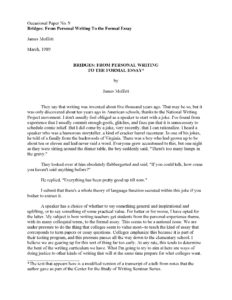Excerpt:
We generally think of all fiction writing–poetry, plays, short stories–as being very different from the writing of ideas. I regard all writing as idea writing. To me the difference is not whether the writing has ideas but how buried the ideas are, how implicit or explicit the ideas are. In literature and recollection, the ideas are more implicit. They are there, but they are embodied, incarnated in personages, incidents, and events. If this is not true of literature, why do we have students digging for meaning all the time? Why do we have them chasing symbols and doing vivisections of poems and postmortems on novels, digging, digging, digging, all the time for meaning?
Here is a great irony. We have a curriculum in which students write exposition; but when they read, they read literature. We should have them do both types of reading and writing. It’s very important for them to have the chance to do some writing in these figurative, fictional modes, because for one thing, these modes are an implicit way of stating ideas. All stories are statements. We can use the term “conclusion” for both fiction and nonfiction. In stories, the conclusions are inherent in the “logic of the events.” If that’s not true, then we should quit having kids analyzing novels and plays for their meaning.


